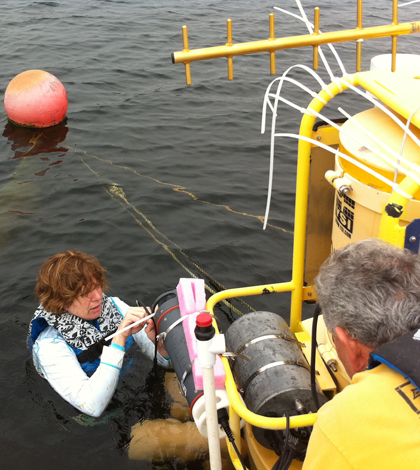Lake Annie Buoy Data Turned Into Music

Evelyn Gaiser conducts repairs on a temperature sensor deployed in Lake Annie. (Credit: Florida International University)
A researcher at Florida International University has taken temperature data from Florida’s Lake Annie and converted them into music, according to a release. The lake is one of Florida’s deepest and oldest lakes and has been extensively studied over time.
Evelyn Gaiser, an aquatic ecologist at the university, used 20 years of data gathered from Lake Annie as well as other data sets from water bodies in Wisconsin, New Zealand and the United Kingdom chipped in by the Global Lake Ecological Observatory Network.
With those measurements, she wielded some musical genius to assign notes to the data points. Commonly, low temperatures were given low notes while warmer ones got higher notes.
Colder water temperatures from the bottom of the lake change more slowly, producing whale-like and mysterious sounds. Warmer temperatures at the top of the lake change faster with changes in weather — these produce faster and more melodic sounds.
Interestingly, Lake Annie’s data set contained two years of measurements depicting a cold snap in 2010. This was marked by lake-bottom temperatures as cold as they’ve ever been in 35 years. The corresponding music came out as sort of like a groaning sound, Gaiser says.
Gaiser notes that changes going on in Lake Annie related to climate change are pertinent to how scientists understand similar changes happening in the Everglades. She primarily works with the Florida Coastal Everglades Long Term Ecological Research program.
Top image: Evelyn Gaiser conducts repairs on a temperature sensor deployed in Lake Annie. (Credit: Florida International University)




0 comments